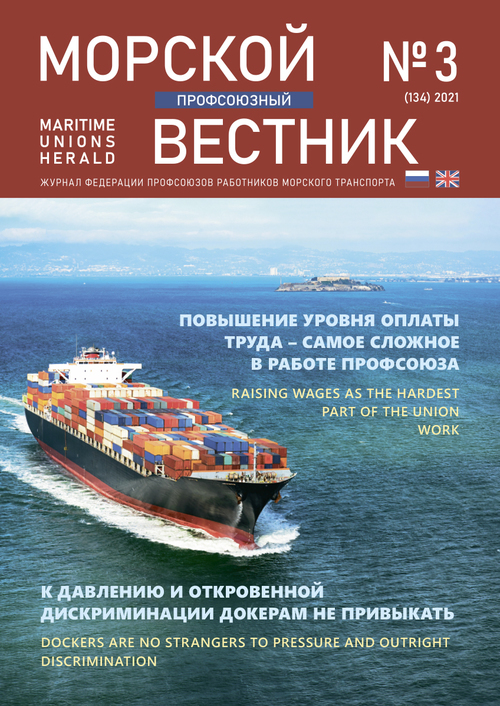ÐÎÑÑÈÉÑÊÈÉ ÏÐÎÔÅÑÑÈÎÍÀËÜÍÛÉ ÑÎÞÇ ÌÎÐßÊÎÂ
SEAFARERS' UNION OF RUSSIA
A NON-UNIONIZED SEAFARER
IS AN UNPROTECTED SEAFARER
Back
The third issue of the Maritime Union Herald was released

The next, third issue of the magazine of the Federation of Trade Unions of Maritime Transport Workers (FPRMT), Maritime Union Herald, has been published this year. It explains how difficult for the SUR territorial organization Murmansk Trawl Fleet was the issue to rise the wage for workers, and how the Dockers Union of Russia resists outright discrimination and pressure from the employer.
«Employers really don't like that we raise the issue of borrowed labor. For example, in many stevedoring companies, people are forced to clean coal cars at the hazard class 2, like as if they are sitting in a cozy office at a computer, and not breathing dust. The low class allows the company to pay the employee a lower salary, deprive the guarantees and compensations provided for by law for working in harmful conditions and make the corresponding meager deductions to the Federal Tax Service and the Social Insurance Fund. There are organizations where labor protection is overlooked, people are treated as resources, so it looks like changing a person is like buying a new broom instead of an old one. When the DUR points to this as a pattern, the pressure begins», -explains the chairman of the DUR Maxim Kolyadintsev.
Therefore, he intends to establish a social partnership with the management of stevedoring companies in the field and solve the problems that have accumulated over the past few years.
Igor Kovalchuk, First Deputy Chairman of the Seafarers Union of Russia, tells about the Federal Industry Agreement on Maritime Transport, signed between employers and trade unions for 2021-2024 and establishing minimum standards of working conditions for seafarers working on ships under the Russian flag. The adopted document has been supplemented, in comparison with the version that was in force for the last three years. In particular, the industry agreement fully reflects the new requirements of the Maritime Labor Convention, which entered into force on December 26, 2020. The amendments guarantee the preservation of the validity of the employment contracts of captured seafarers, even if their validity period has expired during this period. This means that wages and other payments due under the contract will be carried out during the entire period of being in pirate captivity, up to release and repatriation. It is important that seafarers should be repatriated after release at the expense of the employer, regardless of how much time has passed since the capture.
«The industry agreement establishes only minimum standards of working conditions for crewmembers working on ships under the Russian flag. Shipowners can rely on them in the absence of a collective agreement, but at the same time offer their employees much more attractive employment conditions»,- I. Kovalchuk notes.
The collective agreement reduces risks to a minimum –this is the name of another article. For 50 years now, this document has been protecting the rights of seafarers around the world. During this time, it has undergone some changes, but has not lost its relevance, because there is still a place for violations and injustice in the fleet under a convenient flag. The first agreements for ships registered in cheap registers appeared back in 1952, but it was in 1971 that the idea of a single or unified collective agreement of the ITF was approved. It was the document that established a set of norms which are in line with all other ITF agreements, such as agreements on the total cost of the crew and national agreements. Half a century later, with some edits, the standard ITF agreement remains in force today.
Up
